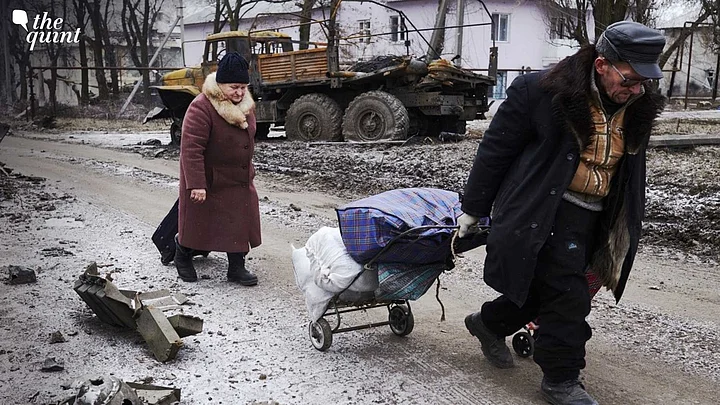A Bloomberg report published on 11 April showed that on the Internet, search interest in Ukraine has plummeted to levels last seen in early January, around six weeks before Russia started its invasion.
The world seems to have gradually lost interest in the war, despite it being as horrific and dramatic since day one, that is, since 24 February.
Google Trends searches for "Kyiv" and "nuclear" (cited by the report) over the last 90 days show how people's interest has been declining in both topics.
The hypothesis is that Russian President Vladimir Putin's nuclear threats, and the attack on the Zaporizhzhia power plant in southeastern Ukraine, in the first week of March, caused panic regarding a possible nuclear conflict.
That panic seems to have been reduced.
Additionally, the report continues, there was an initial belief that the capital, Kyiv, would fall within a matter of days and Ukrainian President Volodymyr Zelenskyy would be overthrown, confirming a decisive victory for the Russians.
That hasn't happened either. Ukrainian forces have driven Russian troops out of suburban Kyiv and Russia seems to have shifted its focus only to the eastern part of the country.
The Bloomberg report, however, while focusing on exogenous variables, does not talk about the role of human nature with respect to why the world is not tracking the war now as much as it was two months ago.
To better understand this phenomenon, The Quint spoke to a clinical psychologist, Dr Kamna Chhibber, head of Department of Mental Health and Behavioural Sciences, Fortis Healthcare, and a psychiatrist, Dr Samir Parikh, director of Mental Health & Behavioural Sciences, Fortis Healthcare.
What Exactly Is 'News Fatigue'?
Dr Chhibber explains that "the constant, persistent presence of any particular stressful situation can be very debilitating for an individual over a period of time."
In whatever way we experience something like a war, whether we are directly affected (being a refugee) or indirectly affected (by say, following it on media), it would "impact our state of well-being because it does lead us to start evaluating what is going on around us."
Even this indirect experience, she continues, raises questions in our minds about our own safety and security, such as:
What protects individuals?
What protects communities?
What about the safety of children?
What is the kind of world that we are creating?
These constant questions in our mind, Dr Chhibber says, do get fatiguing and exhausting even if our life is not directly impacted by the event (like the Ukraine war), raising those questions in the first place.
This is because we experience certain thoughts and emotions as we consume information about the narratives that people are sharing, like their loss, their grief, their homes which are now destroyed.
"The processing of that information creates lots of significant emotions which could make us feel very vulnerable, distraught, low, anxious and unhappy about what is going on. That constant exposure leads to fatigue."
Why We Experience 'News Fatigue'
"At the end of the day," Dr Parikh explains, "we need to find our best state of being, which we try to, we can come through our social interaction, our investment in our own selves."
"We may experience guilt or loss during COVID, when we lose some, or when something happens in another part of the world, we may experience emotions. But whether we experience those emotions long enough or it is lost in the day-to-day of our hassles in our life, that is the aspect we need to focus on."
Dr Chhibber adds that "there is so much that keeps on happening, that at the end of the day, most individuals do get swept up within the course of whatever that is directly happening in their lives. So, while people will experience a lot of concern, a lot of anguish, anger, and sadness around what is going on, if something of significance were to emerge directly in the context of their own lives, they are likely to get influenced by that."
"Their focus then will shift into taking care of those things because most people would want to ensure that they are safe and secure, and that whatever situations could affect their functionality are being take care of."
She further goes on to say that "news fatigue happens because we do not have a sense of agency or control over that situation (which is giving you the fatigue). So, you are not in a position where you can make a change or control the outcome, even when you'd like to do the same."
"To recognise that we are limited on account of our position is, where we are at, what we are doing, there may be small ways in which we can help or support people, and we try to do that in the limited ways that we can. But because we cannot make those large sweeping changes that we may actually desire, it can be difficult."
'Who Is Following the News'?
Dr Parikh also says that it would be too simplistic to say that people are losing interest in the news or that there is too much information to process.
One factor, he says, on which "news fatigue" depends on is who is following the news.
"It is never going to the case that 100 percent of the population would be fully aware or interested or even having the same emotions and thought on something that is happening in some part of the world."
"A lot of people would be aware, some would be concerned, some may be aware but may not have the concern, and some may not be too aware but may be experiencing a lot of anxiety. Therefore, you have subsets of different reactions of people," he concludes.
